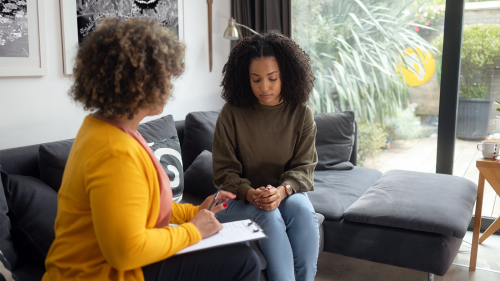Depression

Fact Sheet: Download and Share
Depression is one of the most common mental disorders in the United States. Depression does not discriminate, and can affect anyone regardless of age, race, ethnicity, or gender.
What is depression?
Sadness is a normal reaction to difficult times in life. However, depression is a common but serious mood disorder that can interfere with daily activities. It is important to contact a health care provider about diagnosis and treatment if you believe you have depression.
What are the symptoms of depression?
To be diagnosed with depression, symptoms must be present nearly every day for at least two weeks. Symptoms vary from person to person and may include physical aches and pains. Some common symptoms of depression include:
- Feelings of sadness, emptiness, or hopelessness
- Feelings of worthlessness or guilt
- Loss of interest in activities that you used to enjoy
- Trouble thinking, concentrating, or making decisions
- Difficulty falling and staying asleep or sleeping too much
- Tiredness and lack of energy
- Changes in appetite
- Unexplained physical problems
- Thoughts of not wanting to live or hurting yourself
Who is affected by depression?
Depression can affect people of all ages, races, ethnicities, and genders. Certain people may be at higher risk of developing depression such as people with a family history of depression, a chronic medical condition, or those who have experienced major life changes, trauma, or stress.
How is depression diagnosed?
A health care provider will ask questions about your feelings, mood, behavior patterns, and other aspects of your life. This screening may include a physical exam and blood test to rule out physical causes.
How to Get Help Now
If you or someone you know is struggling or in crisis, help is available. Call or text 988 to access the Suicide & Crisis Lifeline. You can also access the Lifeline via web chat at 988lifeline.org. The Lifeline provides free and confidential emotional support to people in suicidal crisis or emotional distress 24 hours a day, 7 days a week in the United States and U.S. territories.
How is depression treated?
Many treatment options are available for depressive disorders. Treatments can include psychotherapy, or “talk therapy,” medications known as antidepressants, or a combination of the two. Talk to a health care provider to determine the best treatment for you.
Depressive disorders and clinical trials
The FDA encourages people from diverse backgrounds to participate in clinical trials. If you think a depressive disorder clinical trial may be right for you, talk to your health care provider. You can also search for clinical trials in your area at www.ClinicalTrials.gov.
For more information on health equity, visit: www.fda.gov/HealthEquity.
